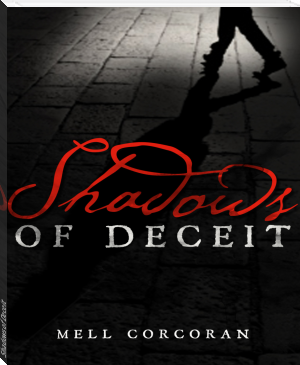A Life for a Life, Lynda McDaniel [best books to read for students txt] 📗

- Author: Lynda McDaniel
- Performer: -
Book online «A Life for a Life, Lynda McDaniel [best books to read for students txt] 📗». Author Lynda McDaniel
But otherwise, I was just sitting round, whittling on a piece of walnut Duane gave me. I was aiming for a little bear, and it was starting to take shape. While I took a little more off its butt (bears have big ones, but not that big), I was replaying what Della had told me about The Day. She’d described Tattoo Man to some folks, but no one claimed to know him. And we still didn’t know nothin’ about the dead girl, except her first name. Not a soul had called Sheriff Brower to report someone was missing. That made me so sad. As sorry as my life was at times, at least Mama and Daddy would’ve been looking for me!
The guy down in Asheville who cut up dead bodies—I forgot what he was called—said she had the sugar, but it weren’t too much insulin that killed her but the poison hemlock in her body. Man, that stuff was bad news. Mama warned me about that when I was just little. We’d go out looking for wild foods like purslane and watercress, and along the way, she’d point out what hemlock looked like. She’d wag her finger at me and tell me to stay away from that stuff.
Oh, and that priest guy, Father Max, showed up the other evening. Della told me later that they’d finished planning a service for Lucy. I heard them upstairs in her apartment; the windows were all open ‘cause we were having a hot spell, odd for April. I saw the notice in the newspaper and asked Mama if I could go to the funeral. She told me, “Well, I’m not leaving you here all alone!”
Even though the store was closed on Sundays, I liked sitting there better than at home. Just before eleven o’clock, Della came down the steps all dressed up for church. She’d just started doing that on Sunday mornings—usually she’d be upstairs with a newspaper and coffee and music like I’d never heard before. She said it was box music, or something like that.
Her leaving meant Jake got to hang out with me. She’d started asking me to look after him when she had to leave for a while, but I had to promise to keep him behind the store, not out front. He was small enough I could handle him all right. She paid me one dollar for each time, which was great for both of us, ‘cause then I had money to buy more in her store.


 Chapter 13: Della
Chapter 13: Della

After the Sunday service, Father Max was busy greeting his small congregation, so I walked to the parking lot to head home. As I opened my truck door, I heard him call out, “The service is all set, I believe.” We’d already worked out the details, so I figured he just needed to talk.
“Do you think anyone will come?” I asked.
“Sadly, yes.” I raised an eyebrow. “Sadly,” he explained, “because they’ll come not to honor a life but to see who else shows up. Maybe a mystery relative will appear, bereft and distraught. That should be good for a few weeks of gossip.”
He looked so down, I gave him a quick hug, even though we didn’t know each other well. He’d been to the store on several occasions, but until the plans for Lucy’s service, our conversations never ventured beyond manchego or cheddar. Cleva told me he’d once led a prominent Episcopal church in Savannah, Georgia, but after a mid-life lapse of judgment involving a parishioner, he was banished to our far-flung outpost. She added that at least he, unlike his Catholic brethren, had chosen an adult.
Quaint Episcopal churches, with their familiar red doors and white exteriors, dotted the mountains of North Carolina. They were vestiges from the days before air conditioning, when low-country families turned a season into a verb and summered here, fleeing the hot coastal areas and bringing their churches with them. Laurel Falls was lucky to have Max Perkins. Generous with his time and comfort, he brought a Christian civility not found in the pulpits of the Church of God and Southern Baptist churches.
“I’ll be at the service,” I assured him. “Thanks for hosting it. Some of the other churches are vilifying Lucy for her habitual drug use, but she was diabetic, for Christ’s sake!” I would have apologized for my slip, but nothing seemed to faze Max.
He just nodded. “We’re both getting a little too cynical, I’m afraid.”
“I prefer to call it ‘world weary.’ That implies having come by it naturally.”
“Say, I’ve been meaning to ask,” Max said, changing the subject, “when you found Lucy, did you see the note she wrote?”
I wondered why he wanted to know—maybe for his homily at the service—but I couldn’t tell even Father Max that I’d read the note. I just shook my head, rationalizing that somehow that wasn’t lying. “Brower’s not giving out much information. I did hear that someone at the courthouse leaked what the note said,” I added to cover myself. “Something like ‘I’m tired and full of sorrow.’”
“That doesn’t say much, does it? I mean, who couldn’t say that?”
“I’m not sure who it was written to. The world?”
“I wonder who has the note now,” he said.
“I think the SBI, you know, the State Bureau of Investigation, collected all the evidence and took it to Asheville.” He made no comment, looking lost in thought. “Doesn’t it seem odd to be a stranger to this area and come here to die? But then, maybe she came as a kid with her family, had fond memories, and wanted to die among the beauty?”
“Makes as much sense as anything,” he said, waving goodbye as he headed toward to the church. With his shoulders stooped and head bowed, he looked as though he were praying for all the lost souls, himself included.
I was leery of do-gooders—to me, most were just wearing a mask of piety. (Maybe Father Max was right about my cynicism.) But he seemed to be the real deal. His hard times stripped him of pretention and showmanship. And, of course, he drank. I seemed to attract a lot of alcoholics into my life. I used to think it was unfinished business, the legacy of two drunken parents, but I’d spent loads of time exploring that. I finally understood that I no longer attracted alcoholics, they were just everywhere. It would be hard not to run into one.
And Father Max was a gentle drunk, like those I saw in D.C. who fed pigeons and saved bread for squirrels and ducks. As their lives bore down on them, they drank spirits to feed their spirit, even if the respite lasted only a short time.
When I pulled out of the church parking lot, I saw Max disappear behind the church’s red doors, undoubtedly headed toward the remains of the communion wine. And I felt a flicker of concern about why he wanted to know about Lucy’s note.


 Chapter 14: Abit
Chapter 14: Abit

“Sometimes things show up when you’re not thinking so hard,” Della said when she came down Monday morning to open up.
She looked wore out, so I wasn’t surprised when she headed straight to the coffeemaker. She said she didn’t want to say anything more just then. But before long, she came out with a mug of coffee and settled in a sunny spot on the bench. The mornings were still cool enough to need a little fire, from time to time, but the sun was getting stronger every day.
That’s when she told me she had some kind of relevation. She said she saw something in her mind’s eye that made her start awake in the night, and she couldn’t get back to sleep. Mama had visions too, so I wudn’t surprised when Della told me about hers. She saw the two notes—Lucy’s suicide note and her note to Cleva—side by side, just as sure as if they was laid out on a desk in real life. That was when she knew something was wrong. The writing didn’t look the same. It was real close, but something weren’t right.
“Yeah, but if I were writing something at a desk at school, and something in my lap out in the woods, they’d look different,” I told her. “Or maybe she wrote it real careful-like before heading into the wilderness.”
“Good points, Mister. But the fact this made itself known to me, rather than my mind working on it, adds weight to my concern. That’s what I meant about not thinking so hard.”
I told her I knew exactly what she meant. “Like the time I knew something was wrong with our beagle, Fuzzy. I told Daddy, but he waved me off. Then Fuzzy passed on within the week. There’d been something wrong with his baying, and I heard it, but I couldn’t put words to it.”
“You keep paying attention to those messages,” Della said. “It’s hard for some people to accept them, but don’t let that stop you from giving them the respect they deserve.”
That’s how Monday started. Later that day, when Della came back from seeing Brower again, she was really upset. I figured from what she’d said earlier, she musta asked him to see the note, the one from the woods, and he’d said no.
Brower was like that. Mean-spirited. The story goes that some six or seven year ago he’d taken up with some girl, but then he dumped her. Just like that. She’d moved to be with him and everything, but when he got into the school where sheriffs and cops go, and he became a lawman and a born again Christian, all at the same time, he left her behind. When he moved back two year later, everyone was all, “Ain’t he a fine man?” just ‘cause he was claiming to be born again and wearing a tin star. I bet that girl he dumped woulda had somethin’ different to say.
But over time, I’d noticed that things balanced out. I couldn’t say it always worked that way, but I’d seen it happen plenty of times. Like Tuesday morning, when I was coming down our steps toward the store and saw Lonnie Parker drive off in a hurry. He didn’t see me, but I could tell he was hepped up about something. I sat down in my chair, reared back, and that’s when I saw the envelope sticking out just a tad under the door. I couldn’t wait till Della came down and found it.
Later that day, something even better happened. Della got a big delivery for the store ‘cause business had picked up. She was trying to get everything inside before it rained again, and she asked me to help and that she’d pay me. Cash—not even trade. I checked with Mama, and she nodded, maybe even smiled.





Comments (0)